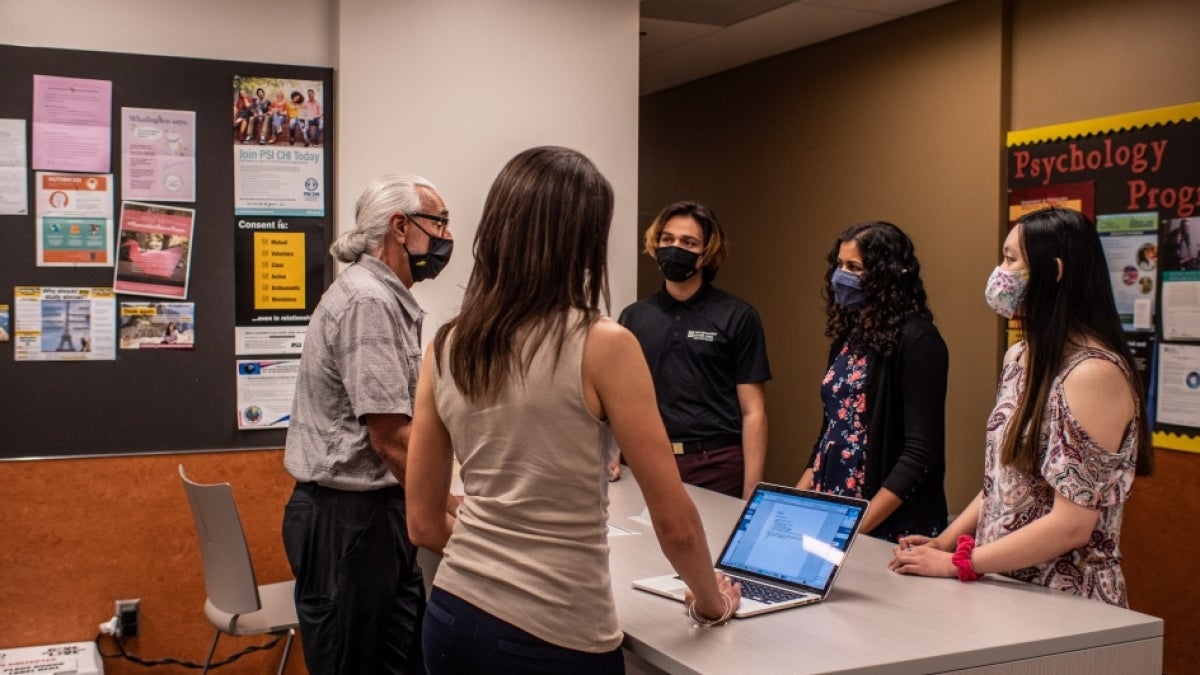Scholarship helps students conduct research on heritage languages, transition to college

Thanks to generous contributions from the ASU psychology community, the Jenessa Shapiro Undergraduate Research Scholarship is helping to continue the research opportunities of psychology students Ema Angulo Rodriguez and Missy Tran. Above, Tran (far right) and Angulo Rodriguez (third, clockwise) attend an ENERGIZE team meeting. Photo courtesy of Robert Ewing
Balancing work and research can be tough for students. Thanks to generous contributions from the Arizona State University psychology community, the Jenessa Shapiro Undergraduate Research Scholarship is helping to continue the research opportunities of psychology students Ema Angulo Rodriguez and Missy Tran.
The scholarship supports one to two underrepresented students annually with funding of up to $5,000 to conduct psychological research.These students previously may have had to work or meet certain time obligations outside of the lab that prevented in-depth research projects or participating in a research lab.
Jenessa Shapiro was an associate professor at the University of California, Los Angeles, an alumna from the social psychology PhD program at ASU, and conducted research on discrimination, in-group and out-group dynamics, and served as a mentor for hundreds of undergraduate students. Shapiro’s memorial scholarship aims to continue her legacy of mentorship and championing underrepresented students.
Tran, a triple major in biochemistry, neuroscience and psychology, is interested in an MD/PhD program. She had previously conducted biology research but wasn’t familiar with getting involved in the Department of Psychology.
“I like being at the intersection of where medicine meets research. I was interested in getting into psychology-based research, but didn’t know where to start,” Tran said. “It can be extremely intimidating to want to begin something new but have no mentors to turn to in order to ask questions.”
Fortunately, both Angulo Rodriguez and Tran saw emails about the ENERGIZE program in the department and applied. The ENERGIZE program helps to facilitate the process of connecting underrepresented undergraduate students with research labs and mentors.
After meeting with mentors from the program, Tran joined the Trancisiones project led by Professor Leah Doane, and Angulo Rodriguez began conducting research with Assistant Professor Viridiana Benitezin the Learning and Development Lab.
The Transiciones project follows over 200 Latino students who are attending ASU, tracking sleep data, stress hormones and their general health while making the transition from high school to college. In this project, Tran conducts training Zoom calls with study participants to prepare them for their upcoming study visits and to answer any questions they may have.
Missy Tran
“We analyze what cultural and institutional factors influence the Latino population as they transition into college and what influences their success academically and socially,” Tran said.
Her hard work on the project has already stood out to her mentors and teammates.
“Missy is an exemplar from the ENERGIZE program: She is highly motivated, curious and bright, and has persevered with flexibility in the face of adversity,” Doane said. “She currently balances working for her family’s small business, a paid teaching assistantship in chemistry, her leadership of a STEAM mentoring program, in addition to her lab work and coursework as a Barrett Honors College student with a 4.0 GPA.”
Because of her positive experience working with Doane in the Transiciones lab, Tran is also joining the Arizona Twin Project lab this summer. She will conduct research using the Arizona Twin Project data to better understand what promotes resilience in families that face adverse childhood experiences.
“This scholarship award allows me the time to invest in developing my research skills and not having to worry about finances,” Tran said. “It feels good to know that there is a scholarship available for underrepresented students in research.”
Promoting heritage language learning
Ema Angulo Rodriguez
Angulo Rodriguez is interested in social linguistics and bilingualism and how to maintain heritage languages. Her research interests center on bilingualism and its impact on academic achievement. As a first-generation college student from Caracas, Venezuela, Angulo Rodriguez has seen firsthand the deterioration of her Spanish language skills, even though it was her primary language growing up.
“Research shows that throughout generations, Spanish language proficiency decreases,” Angulo Rodriguez said. “I want to know what sort of interventions are effective to promote the maintenance of heritage languages in the United States.”
Angulo Rodriguez currently works two part-time jobs and was considering a third until she received the scholarship. Along with her degree in psychology, she is pursuing a minor in Spanish linguistics with a certificate in political economy. She is also part of the Next Generation Service Corps, a four-year leadership development program at ASU.
“Oftentimes underrepresented students face unique obstacles that are very intertwined with their identities. As I’ve come to terms with my trans identity, I’ve lost financial support from my family. That then turns into another challenge of balancing financial independence with being a full-time student,” Angulo Rodriquez said. “I’m just extremely grateful to the Jenessa Shapiro Scholarship because this scholarship allows me to focus on research without needing to financially support myself.”
Go here if you would like to contribute to the scholarship to help expand research opportunities.
More Science and technology

ASU professor breeds new tomato variety, the 'Desert Dew'
In an era defined by climate volatility and resource scarcity, researchers are developing crops that can survive — and thrive —…

Science meets play: ASU researcher makes developmental science hands-on for families
On a Friday morning at the Edna Vihel Arts Center in Tempe, toddlers dip paint brushes into bright colors, decorating paper…

ASU water polo player defends the goal — and our data
Marie Rudasics is the last line of defense.Six players advance across the pool with a single objective in mind: making sure that…

